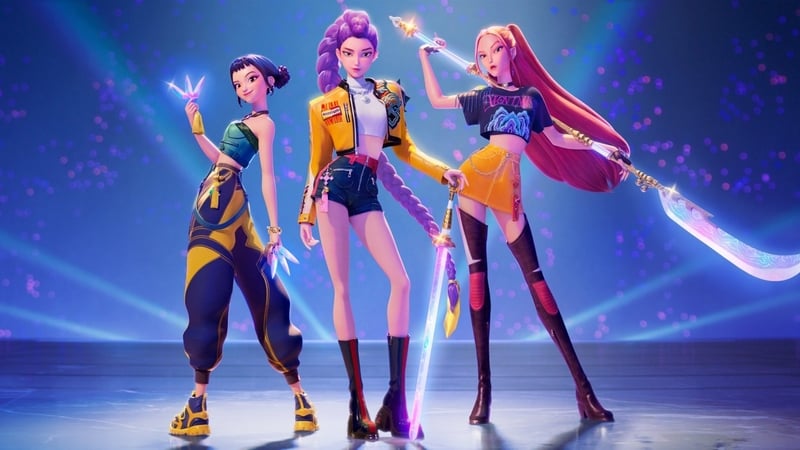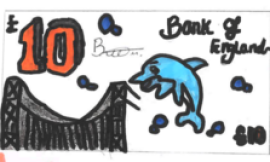If you don’t think the tale of KPop girl-group Huntr/x – which sing songs by day and battles demons by night – is a good basis for a smash hit movie, you wouldn’t be alone.
Sony Pictures Animation – which developed the story – clearly didn’t have high hopes for it either.
To explain how we know this, we need to go back to a deal that was done in 2021.
While the likes of Disney, Paramount, HBO and MGM have all waded into the streaming video market, Sony is one of the few big studios to have steered clear.
But in 2021 it did agree a deal with Netflix, which essentially made Netflix the defacto streamer of Sony movies – for the next few years at least.
The deal had two parts – one side allowed Netflix to be the first streamer for Sony movies that had finished their run in the cinema. That would include the likes of Paddington in Peru, Bad Boys for Life, and the Venom series.
The other side of the deal – and the one that’s relevant here – gave Netflix dibs on any films Sony was making that it intended to launch directly to streaming or video on demand. As part of the deal, if Netflix was interested in a movie, it would cover the cost of its production and pay Sony a fee on top.
And that’s where KPop Demon Hunters came from.
Sony offered it to Netflix while it was still in the early stages of development in 2021 – because they clearly didn’t have much confidence that it would draw in enough of a crowd as a cinema release.
Netflix agreed to pay $100m to cover the cost of finishing the film – and then it paid a $20m fee to Sony.
Sony obviously thought was a good deal – and far better than the potential risk of a costly box office bomb.
Did Netflix realise it had a hit on its hands?

It doesn’t seem like it.
You might think that, having spent $120m on the movie, they would want to give it a big push and ensure it drew in viewers. But while $120m is a lot of money to most, it’s not really that big of a deal to Netflix.
The company previously said it was planning to spend $18 billion on content this year alone.
Another movie which came out this year – which Netflix did really try to push through ads and media campaigns – was The Electric State, which cost somewhere in the region of $320m to produce.
So $120m isn’t exactly budget-breaking for Netflix.
And sure enough, when KPop Demon Hunters came out on 20th June, it happened with relatively little fanfare.
It did get prominent billing within the platform – but there wasn’t much in the way of a marketing campaign around the film’s release; there weren’t big billboards or TV ads, there wasn’t the media junket, or any kind of promotional tie-ins with other brands. These are all the kinds of things you tend to see a studio do when it’s pushing a new release.
Perhaps the most significant proof that they weren’t expecting a hit is the fact that they didn’t have any merchandise or toys ready either – a crucial piece of the puzzle for any film targeted at kids.
And they’re clearly now scrambling to fill that gap.
They have brought out some movie-related clothing lines and are now taking preorders on some Funko Pop figures of characters from the movie… but they won’t be actually going out to customers until the start of next year.
If Netflix wasn’t really promoting it, how did it become such a hit?

A lot of that is being attributed to the fact that KPop as a genre has a huge global following, and a very committed one at that.
The film appears to have done a good job of representing the music and the culture that surrounds it, so it’s been embraced by the KPop community.
It also doesn’t hurt at all that the soundtrack is packed with really catchy songs – and the film itself, despite what the name suggests, is fairly upbeat and fun.
And that meant it leant itself to social media posts – with people using songs on Reels and TikToks, or attempting to mimic the characters’ dance routines. Many parents jokingly posted about how they had become inadvertently hooked on the soundtrack after overhearing their kids listening to it.
Next thing you know, it became a bona fide smash hit.
Last week Netflix said it had racked up 236 million total views so far – making it the streamer’s most popular movie ever.
That’s five million more views than Red Notice, which came out four years ago, and got a major marketing push from Netflix. It also featured what was at the time an A-list cast including Dwayne ‘The Rock’ Johnson, Gal Gadot and Ryan Reynolds. It was basically created in a lab to be a blockbuster hit.
But KPop Demon Hunters has not just been a hit within the Netflix platform; one of the songs from it – ‘Golden’ – has topped music charts around the world – including the Billboard charts in the US.
As it stands, four of the top ten songs in the Billboard charts are from the film – the first time a soundtrack has managed to do that.
On the back of the success Netflix also had a limited cinema release of a singalong version – but it was popular enough to become the first US box office number one the streamer has ever had.
Netflix is benefitting from its success now – what about Sony?

They have their $20m – and that’s about it.
The deal they have with Netflix means they’re not entitled to any kind of cut of Netflix revenue based on its performance – nor would they have profited from the limited cinema release of the singalong version.
And even though Sony is also a music publisher, they’re not even benefitting from the success of soundtrack. That was released by another label – Republic Records – which is part of Universal Music Group.
Sony may get some kind of cut of any future merchandise or toy sales – whenever they begin – though depending on the small print of their deal that may also go entirely to Netflix too.
At this stage Sony’s best hope of making big money from KPop Demon Hunters is through the inevitable sequel – or even sequels. They are said to already be in the early stages of planning and will need input from both Sony and Netflix to become a reality.
Sony must be pretty sore about it though…

It feels a bit like a modern version of Mike Smith and Decca Records – who infamously turned down the chance to sign The Beatles because ‘guitar bands are on the way out’.
And it is worth bearing in mind that Sony Pictures’ leadership has in recent years been bemoaning its lack of intellectual property. It’s been on the hunt for new ideas that can be developed into a series of films, TV shows and spin-offs – just like what Disney and Warner Bros can do with some of their content.
As it turns out, that’s exactly what KPop Demon Hunters is now on the verge of becoming but, because Sony gave it away, it’s not Netflix that stands to gain the most from it.
In fairness to Sony, though, it is worth looking at the context of the deal they made for this film.
As people will remember, back in 2021 the film industry was in the doldrums due to Covid-19 restrictions. People weren’t going to the cinema in great numbers, and it was unclear if and when normality would resume.
And while restrictions have long been lifted worldwide, audiences still haven’t recovered from that time – in part because of streaming. It now takes a lot more to convince people to actually go and pay to see a movie. And they tend to only do so when it’s something they know – like a sequel to a film they already love, or something that’s part of a franchise they’re into.
And even within that, there’s no guarantee of a hit. Disney just recently released Marvel’s Fantastic Four in the cinemas – a big brand, with a big marketing push and some decent reviews – but by the time its run is over it will probably have just about scraped a profit.
And of course a big part of what made KPop Demon Hunters such a hit was the fact that there was a low barrier to entry for viewers. Most people already have a Netflix subscription, so when they see and hear a lot of buzz about a movie there’s minimal risk for them to go and check it out.
But if they’d had to go to the cinema and pay money for a ticket – and tickets for their kids too – how likely would they have been to take a chance on it?
Not to mention the fact that many of those 236 million views have come from repeat viewings from the same household.
So with all that in mind, it’s understandably why Sony thought that a guaranteed $20m for an unknown and unproven film wasn’t actually all that bad of a deal.
Just how big is KPop?

It is massive globally – though for the most part it tends to sit just outside of the mainstream in the likes of Ireland.
One KPop song that people here are most likely familiar with is Gangam Style by Psy – which became the first video ever to get one billion views on YouTube back in 2012.
But really there are two big groups of KPop – BTS and BlackPink.
Boy band BTS has, at times, been the most streamed on Spotify. Most of their top ten songs on Spotify have more than a billion streams, with one clocking up more than two billion.
Meanwhile girl band BlackPink has nearly 100m followers on YouTube, and 55m followers and nearly 33m monthly listeners on Spotify.
And while KPop has, unsurprisingly perhaps, gained most of its following in Korea and Asia in general, its appeal has stretched to Europe and North America – even before the demon hunters came on the scene.
BlackPink just recently brought its tour to Europe, including dates in Paris, London and Milan – playing to around 300,000 fans over six nights.




